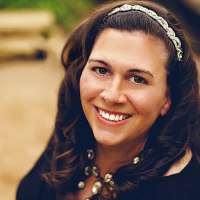Jennifer Haskin Interview Published on: 03, Apr 2020
 Where were you born? Where have you spent most of your childhood?
Where were you born? Where have you spent most of your childhood?
I was born in North Kansas City, Missouri. I grew up there. I went to college in Columbia, MO at MU, and then Friends University where I got my degree. Then I got married and moved to Montana, then Colorado, then Kansas. And I live in the greater Kansas City Area.
What did you want to become when you grow up?I wanted to be a teacher, a writer, a singer and an artist. I guess I’ve been able to do all of that. And it makes me happy. I love all things bookish, and I love teaching and helping other authors.
Who introduced you to the world of books?Probably my mom. She was an avid reader when I was growing up and she really encouraged me to find a good book to experience.
Since how long have you been a literary agent? How has it helped you in your writing career?I was only a literary agent for a few years. I kept learning, though. I had to leave because I had four spinal surgeries in three years and I couldn’t keep up with a job like that and do it well. I know now that I didn’t really know enough then to recover and be an agent, so I went into consulting. During this time, I was also learning as an author and all the “what NOT to do” practices and what good agencies and good publishers are. I happened to be speaking to a friend of mine in the business when I discovered she had an opening for an editor and she asked if I was interested. I started in September and I love it! I now know how an agent can look at a first couple of pages and know if it’s a manuscript worth taking. I remember asking people when I first got started, and everyone said, you just “know” when it’s good. Well, it isn’t that mystical, but the amount of items that it must check off the list is huge and most people don’t want to sit there and list it out for you. But just for starters, it has to do with recognizing good sentence structure and good story-telling voice, the inclusion of great details, but they must be incorporated for a reason, without info dumps. Correct grammar and punctuation, which means also correct dialogue and action tags. A story structure, among many other things.
How would you describe your experience of being an Associate Editor at Touchpoint Press?Fabulous. I love all my clients and I have so enjoyed not only reading the stories, but helping some of the authors re-write and re-model to make their manuscript a work of art, that they are proud to put their name on and stand behind. I don’t just correct things, if it’s an issue that keeps coming up, or a story issue, I tell them what I think and why. I teach them the correct way to do it so they learn and their next book can be even more amazing from the start. And I know with each book, they’ll improve. It makes me proud of my work. I share my clients’ new releases in my newsletter.
When did you begin writing? Who reads your first piece of writing?I began writing very young. I won my first award in the fourth grade, and in the fifth, then I was published in the ninth grade in a magazine, and then in annual school district publications. I took a hiatus to be a portrait artist for many years and got back into writing in my 30s. The first person who read my first book and told me that I could do this was my best friend, Terri. We had gone to preschool through high school together. We had a few years that I moved away and she bonded with other people. Then I came back to town and we picked up like we’d never been apart. She read my first book and was so excited to help me. We met every couple weeks for several hours at Applebee’s and talked “book” over finger foods and cokes. Then she got cancer. One year later, she died and I shelved that book. But the dedication in The Key of F is to her. I often get asked who that is, and it’s my Terri.
Right now, the first person to read my writing is usually my writing partner, Alisha Davis. She is also a wonderful, sweet spirit. The next people are my mom, and then my sisters-in-law: Mindy and Beca.
What is the objective of your weekly writers' workshop?Right now there’s only three of us. During the summer, we fit eight or more of us around my table and talk about what we’re writing. I make flowering tea and coffee, and we plate some snacks and talk for hours every week. We plot together, throw around ideas, ask for opinions, and someone gets their work read aloud. Right now, since we’re so small, we just take turns and everyone has a chapter to read and someone else reads your chapter aloud to you so you can hear how it sounds and make adjustments that are necessary for great dialogue and narrative. I am an editor and my writing partner (who travels from another city an hour each way every Monday just for our group), is an English teacher. It’s awesome, because we fill in each others’ weaknesses. She catches all my semicolon snafus, and I ask her leading questions. COVID-19 has been hard because I miss my writers’ meeting, but I encourage all authors to find writer friends and make a weekly Skype or WhatsApp call to talk and read each other’s work. We also have a folder in Google Drive where we each have a folder to keep our work and whatever is to be read goes on the main page, so people can poke in and read any time they want. We leave comments and then talk about them at the meeting if we’re editing. If we are writing, we just read each chapter as we go.
How did you begin writing the Freedom Fight Trilogy?It’s funny. I had a dream one night where I saw ONE SCENE, but there was so much understood backstory. I saw a young man and woman running through a building full of sleeping people, but what I understood was much deeper. When I opened my eyes, I saw credits scrolling up, and it was like God said, “It’s a book, dummy.” That was 6am on a Sunday morning and I really wanted to go back to sleep, but I couldn’t. I grumbled and got out of bed. I said I would write down everything about the scene and everything I understood from the backstory. I grabbed a pen and notebook and wrote for the next 13 hours straight. It was out.
So the next day, with no more dreams, I typed what I wrote. I wrote the whole trilogy out long hand and then typed it. The first book took two and half weeks. I couldn’t write fast enough sometimes. The second book took me the next two and a half weeks. And the third book took me a year, because I was becoming an agent and marketing and my agent was getting me a contract, etc.
With the release of The Queen's Heart in 2019, how did your writing style change?I think after The Queen’s Heart, I started writing darker work. I wouldn’t say it’s necessarily horror, but I have heard on more than one occasion that some of my scenes and idea have given people nightmares. That’s a compliment to me. If what I wrote can affect you so much on a subconscious level, that you dream my stories, that excites me.
What challenges did you face while writing the end of Fale and Keron’s journey in The Final Rescue?I really wanted Fale to change throughout the series, and I think she does. A few people comment that she’s a bit whiny in the first book, but that’s done on purpose. She’s not so much whiny as naïve, and inexperienced, and scared and unsure. She complains about her situation and like most teens, she just wants a way out. But that’s not her destiny. So at the end I really wanted to show her strength, and also show that Keron’s learned to trust her and to realize that protecting her means more than shielding her from everything. It’s letting her be herself and make her own mistakes so she can grow, and being there for her when everything falls apart. He has to learn to be her rock, but let her be the star.
Who inspired the character of Fale?Fale was a lot of me in the beginning. And that’s a rookie mistake. New authors often inject themselves in their characters. And then when people say, “I don’t think [Fale] would do that there.” I would think, “Of course she would, because that’s exactly what I would do.” Now not everything your character does will make sense. Especially if they are a rebellious, headstrong, teenage girl, but your character should have rounded out sensibilities and most of their actions should make sense for their “inner character.” It’s also a lot harder to take criticism on your work when it’s all about you and your choices. I would get so upset when people didn’t see what I was trying to say, or would get it so wrong they’d think I was saying something else entirely. But now, if someone says, “I don’t get their motivation for doing that.” I give an inner shrug and tell myself, “I guess I didn’t make that clear enough. Guess I’d better fix that.” I am a bit long winded, and that’s why. I never want people to misunderstand what I’m saying or why I’m saying it. Long story short, over time Fale became her own woman all on her own, as I grew as an author.
What are some things to keep in mind while writing a YA fantasy romance?1| Writing YA is easier for me, I think the voice has to come easily for you. Mostly, you have to watch out for YA tropes when designing your story. I wrote blog posts on voice and YA tropes in May of 2018. The biggest thing I see in Ya is the Mary Sue/Gary Stu character--a protagonist who has high standards, tries to do the right thing, but when a villain endangers their loved ones, they sacrifice themselves to save everyone, won’t intentionally kill, won’t choose one life over another, won’t let someone harm themselves, won’t leave anyone behind, thinks villain is likewise honest. As I mentioned with Fale, make your character a real person with real flaws. When I am writing a story and planning the scenes, I think, “What’s the worst thing that could happen?” And then I make that happen. Because in real life it’s not often the unsurmountable odds, but our own mistakes in trying to do the right thing, that cause our own destruction. Make your characters face real adversity and give them their own reaction. Not just whatever you would do. Fale started out as a Mary Sue. 2| In YA there’s often surprise royalty or powers (Fale again), people are killed for not conforming, there’s an overly elaborate plot with a life changing mission for characters built on quirks/stereotypes; there’s an omniscient government that controls everyone, the hero refuses to fight in an uncomfortable world, than an intervention by a mentor changes their mind, they overcome fear, the hero faces the ordeal, gets ready to fight (weapons training), wins the reward (love), the best guy friend ends up being Romeo all along, there is chase scene on the road back home, and the hero saves the day. Possibly winning via a magical talisman. 3| Most YA characters have NO parents- or dead parents (Orphan protagonist), abusive parents (protagonist in foster care), negligent or oblivious parents (protagonist runs around with absentee parents, no curfew, no one to call if they leave town). In my current WIP (The subject of my blog series: Journey of a Bestseller) I have a teen boy with loving parents. Of course he goes into the fantasy world without them, but the girl protagonist also has a loving father. I challenge new YA writers to include families. 4| On the opposite side of Mary Sue we have the unqualified teen protagonist succeeding over qualified adults. This often goes along with one of the following: The chosen one- you are the only teen on earth capable of outwitting a league of demons. Or the “Strong Female Protagonist” who hates all girly stuff i.e. clothes, crying, makeup, girly actions, she’s a total tomboy with combat skills. And of course she wears no makeup beside lip gloss, or Chapstick. Like the rebellious princesses--or clumsy princesses--with weapons skills that beat the evil master. Or the beautiful girl with hidden talents, who thinks she ugly until some angsty boy tells her how beautiful she is--now she can do anything!! 5| Speaking of angsty boys, avoid the “Brooding Loner” that no girl can resist OR is perfectly, angelically handsome, yet only likes the mousy girl. Insta-love, life-changing kisses, soul mates without a choice, and love triangles are overdone no-nos. Characters with crazy odd names and/or spellings that no one can pronounce can give readers a headache. Any of these sounding familiar? For a few years they were all the rage. 6| Finally, don’t have purely evil villains with no motive, one dimensional BFFs, or inauthentic dialogue--overdoing slang, dumbing-down, including trends, preaching moral lessons. These tips are for authors of all ages, in all genres. Be careful of these things and you’ll do just fine. Of course you can still have one or two of the elements above, but look out if this sounds exactly like your YA fantasy romance.
Which is the best place to try a grande iced white mocha?Don’t hate me, but Starbuck’s is it. I don’t like their mocha because their coffee is so strong and the chocolate makes it very bitter to me. But a WHITE mocha? Perfection. And I like them iced all year round. That also takes some of the strength and sweetness, so it rounds out perfectly. And grande is my size. Short and squatty. Lol.
What is your YA Steampunk series about?Ooh, I’m excited about this question. I feel like I am at a great place in my author life where I know what a good manuscript looks like and how to write one, so I plan to query this one because I really want the support of my family, and to my family, you are a success when they can walk into the bookstore and see you on the display.
So I am writing a four book series. The first one is about a 17 year old boy named Wyll, who opens a closet door to find another world created by a man with a magic pen. He meets a feisty redhead in a gunbelt and feels a little more than sick to his stomach. Sira has been trying to get out of Sepherra for twelve years, ever since her father brought her to live there. She wants out in the human world. In the hands of a human, the king’s pen creates cities of life, only they aren’t built on a skeleton of bones, but a frame of clockwork. They are people just the same, and using the pen is slowly turning the king insane. Both stuck there together, Sira has to learn to trust Wyll after he initially betrays her, if they ever stand the chance of escaping the mad king.
Thus begins their adventures. The next adventure takes place in a desert, the third book in the Wild West, and the fourth book, I haven’t gotten fully plotted yet.
How has been your experience of working with AllAuthor?I have really enjoyed AllAuthor. It was affordable to feature all my books, and AllAuthor tweets really professional gifs and posts on my behalf every week. Then I’m allowed to download copies of the ads to use elsewhere. The tools are amazing. I use the magic tool to download .pngs of my books to put in Canva ads for Bookbub, Instagram, and Facebook/LinkedIn banners. I have recommended it to my clients when I help them with marketing. I blog weekly about writing, editing, publishing and marketing, and I feature all my favorite sites. AllAuthor has been one since I found it. You can follow my blog on www.jenniferhaskin.com.
Share Jennifer Haskin's interview
Author Jennifer Haskin was born in North Kansas City, Missouri. She wanted to be a teacher, a writer, a singer, and an artist. The author began writing very young. She won her first award in the fourth grade, and in the fifth, then she was published in the ninth grade in a magazine. She creates great fantasy and sci-fi worlds with engaging plots and relatable characters.
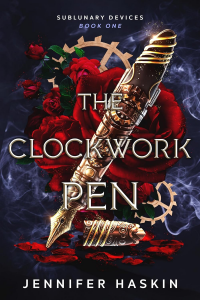 The Clockwork Pen: A romantic dark science fiction steampunk adventure (Sublunary Devices Book 1)
Genre: Suspense, Action & Adventure, Contemporary Romance, Romantic Suspense, New Adult Romance, Romance, Science Fiction, Fantasy, Horror, Teen & Young Adult
The Clockwork Pen: A romantic dark science fiction steampunk adventure (Sublunary Devices Book 1)
Genre: Suspense, Action & Adventure, Contemporary Romance, Romantic Suspense, New Adult Romance, Romance, Science Fiction, Fantasy, Horror, Teen & Young Adult
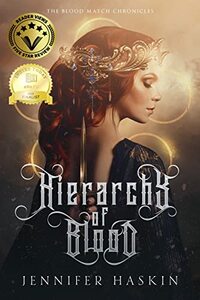 Hierarchy of Blood: A YA Dystopian Romance (The Five Colonies Book 1)
Genre: Suspense, New Adult Romance, Romance, Science Fiction, Teen & Young Adult
Hierarchy of Blood: A YA Dystopian Romance (The Five Colonies Book 1)
Genre: Suspense, New Adult Romance, Romance, Science Fiction, Teen & Young Adult
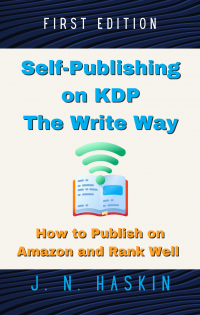 Self-Publishing on KDP the Write Way--How to Publish on Amazon and Rank Well: A Step by Step Beginner's Guide to Formatting and Publishing eBooks and Paperbacks ... Want to Sell More Books (Author's Journey)
Genre: Advice & How To, General Nonfiction, Business
Self-Publishing on KDP the Write Way--How to Publish on Amazon and Rank Well: A Step by Step Beginner's Guide to Formatting and Publishing eBooks and Paperbacks ... Want to Sell More Books (Author's Journey)
Genre: Advice & How To, General Nonfiction, Business
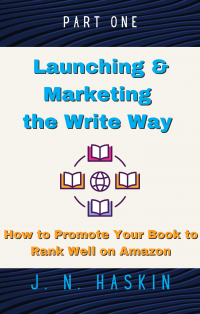 Launching and Marketing the Write Way for Self-Publishers on KDP--How to Promote Your Book to Rank Well on Amazon: Beginner's Guide on Marketing Techniques ... for Online Sales (Author's Journey)
Genre: Advice & How To, General Nonfiction, Business
Launching and Marketing the Write Way for Self-Publishers on KDP--How to Promote Your Book to Rank Well on Amazon: Beginner's Guide on Marketing Techniques ... for Online Sales (Author's Journey)
Genre: Advice & How To, General Nonfiction, Business
 Princess of the Blood Mages (Freedom Fight Trilogy Book 1)
Genre: Action & Adventure, Romantic Suspense, Science Fiction, Fantasy, Teen & Young Adult
Princess of the Blood Mages (Freedom Fight Trilogy Book 1)
Genre: Action & Adventure, Romantic Suspense, Science Fiction, Fantasy, Teen & Young Adult
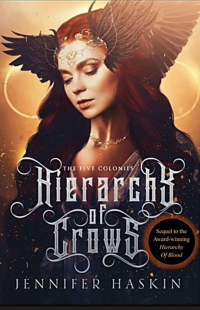 Hierarchy of Crows: A teen & young adult dystopian-scifi adventure romance in space (The Five Colonies Book 2)
Genre: Suspense, Romantic Suspense, New Adult Romance, Romance, Science Fiction, Teen & Young Adult
Hierarchy of Crows: A teen & young adult dystopian-scifi adventure romance in space (The Five Colonies Book 2)
Genre: Suspense, Romantic Suspense, New Adult Romance, Romance, Science Fiction, Teen & Young Adult
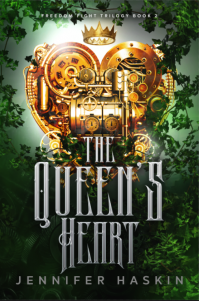 The Queen's Heart (Freedom Fight Trilogy Book 2)
Genre: Action & Adventure, Romantic Suspense, Fantasy, Teen & Young Adult
The Queen's Heart (Freedom Fight Trilogy Book 2)
Genre: Action & Adventure, Romantic Suspense, Fantasy, Teen & Young Adult
 The Final Rescue (Freedom Fight Trilogy Book 3)
Genre: Mystery, Action & Adventure, Romantic Suspense, Fantasy, Horror, Teen & Young Adult
The Final Rescue (Freedom Fight Trilogy Book 3)
Genre: Mystery, Action & Adventure, Romantic Suspense, Fantasy, Horror, Teen & Young Adult
